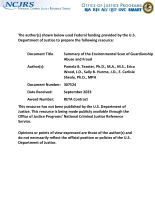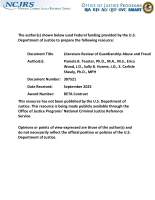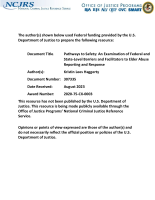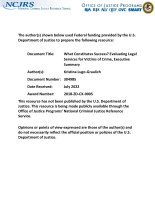Legal research
Literature Review of Guardianship Abuse and Fraud
A Nationwide Assessment of Jail Reentry Policies and Practices: A Two-Tiered Study of the Field
Caring Connections for Youth: Evaluation of a Countywide Pre-Arrest Diversion Initiative to Reduce Racial/Ethnic Disparities
Mapping the Continuum of Support for Violent Extremism in the United States
Can Science Enhance Equity? Findings and Implications From a Study To Detect Bruising on Victims with Dark Skin Pigmentation
This plenary panel from the 2023 NIJ Research Conference features fascinating research on a methodology to improve the detection and documentation of bruises on victims of violence who have dark skin pigmentation. This study highlights the intersection between science, justice, and racial equity, featuring practitioner and victims’ advocacy perspectives. The discussion describes the research and its findings and explore strategies to ensure that this particular evidence-based methodology can be widely implemented by nurse practitioners in the field.
Participants:
See the YouTube Terms of Service and Google Privacy Policy
Pathways to Safety: An Examination of Federal and State-Level Barriers and Facilitators to Elder Abuse Reporting and Response
The Only Thing Constant is Change: Temporal Analyses of Racial/Ethnic Sentencing Disparities
Looking Beyond the Sentence: Research Summary
Replication Validation of a Human Trafficking Screening Tool for Law Enforcement and Estimation of Prevalence
What Constitutes Success? Evaluating Legal Services for Victims of Crime, Executive Summary
What Constitutes Success? Evaluating Legal Services for Victims of Crime, Final Site Report: Oregon Crime Victims Law Center
Research at the Faculty of Criminal Justice and Security, 2001-2005 (A Collection of Research Abstracts)
The Hidden Costs of Reentry: Understanding the Barriers to Removing a Criminal Record
NIJ hosted a webinar to discuss under-researched aspects of reentry: expungement of criminal records and the impact of those records. This webinar includes a presentation of ongoing research projects examining the impact of legal aid for expungement and past research projects studying the accuracy and permanency of criminal records and the prevalence of collateral consequences of conviction. A Q&A session will conclude this webinar.
See the YouTube Terms of Service and Google Privacy Policy
Situational Deterrence and Claim Padding: Results From a Randomized Field Experiment
Booker and Beyond Analyzing Sentencing Reform and Exploring New Research Directions
This webinar features a discussion of previously published research on the U.S. Supreme Court’s 2005 Booker decision - which effectively transformed the United States Sentencing Guidelines from a mandatory, to an advisory, system. The presentation will address selected research findings from the last 15 years. Individual participants will briefly review their previous research findings with particular attention paid to the analytic methods used.
See the YouTube Terms of Service and Google Privacy Policy
NIJ-Funded Research on Firearms Violence in Urban Cities Advancing Scientific Evidence to Inform Practice
In this full thematic panel, renowned experts will present a series of papers summarizing the newest findings of NIJ-funded research projects on criminal offenses with firearms in urban areas. Researchers used various criminological and other theories, including routine activity theory, socio-ecological and socio-environmental perspectives, and advanced mixed-study methods, including surveys and spatio-temporal designs, to produce scientific evidence to inform practice.
See the YouTube Terms of Service and Google Privacy Policy
Court Decision-Making in Domestic Violence Cases: An Analysis of the Case Processing Pipeline in South Carolina
Survivor-Defined Advocacy in the Civil Protection Order Process
Expanding Research to Examine the Impacts of Forensic Science on the Criminal Justice System
In 2004, the National Institute of Justice created the social science research on forensic sciences (SSRFS) research program to explore the impact of forensic sciences on the criminal justice system and the administration of justice. Much of the early research from the SSRFS program focused on DNA processing and the use of DNA in investigations and prosecutions.
See the YouTube Terms of Service and Google Privacy Policy







